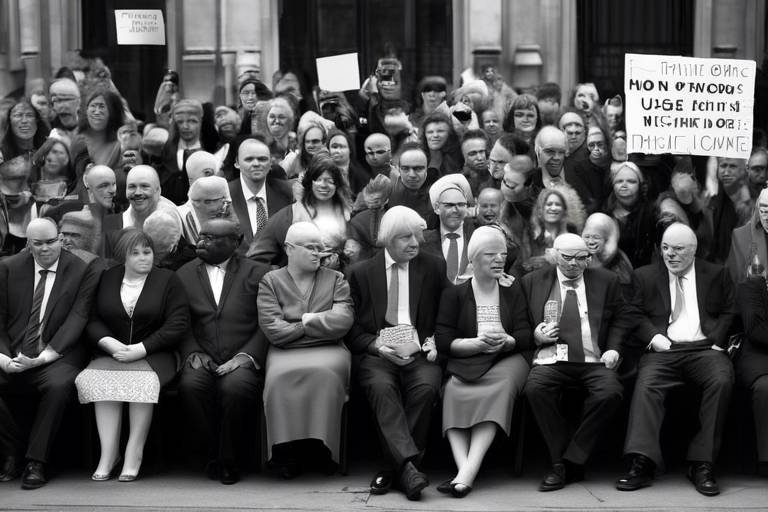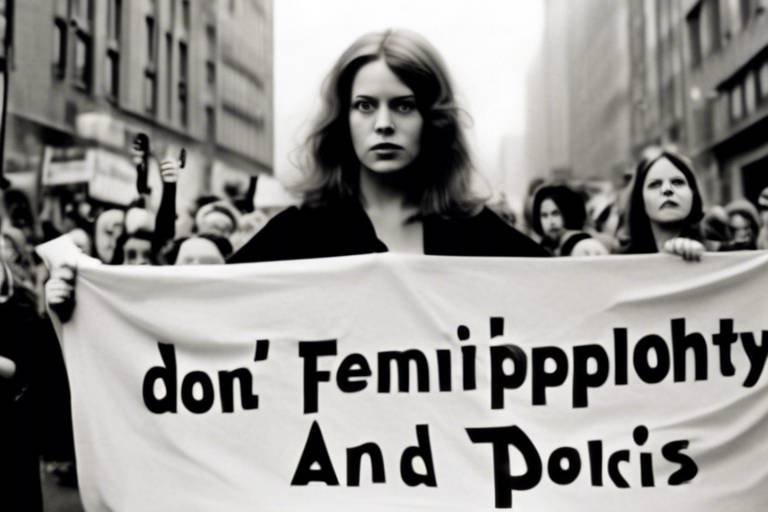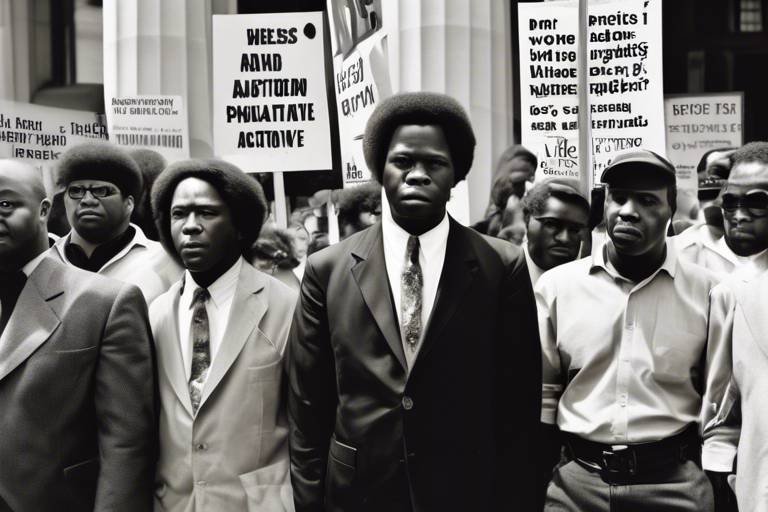The Philosophy and Politics of Basic Income
Basic income is a concept that has been gaining traction in recent years, stirring conversations across various sectors of society. But what exactly does it entail? At its core, basic income is a model of social security that guarantees a regular, unconditional sum of money to every citizen, regardless of their financial situation. This idea isn't just about handing out cash; it's about reshaping the very fabric of society. Imagine a world where financial stress is alleviated, where individuals have the freedom to pursue their passions without the constant worry of making ends meet. Sounds appealing, right?
The philosophical underpinnings of basic income are deeply rooted in the principles of justice and equality. Think about it: in a society where wealth is increasingly concentrated in the hands of a few, basic income offers a radical solution to redistribute resources more equitably. It challenges the traditional notions of work and productivity by suggesting that everyone deserves a financial safety net simply for being a part of society. This notion raises profound questions: Shouldn't we prioritize human dignity over mere economic output? Isn't it time we recognized the inherent value of every individual?
As we dive deeper into the political implications of basic income, we encounter a complex landscape filled with both opportunities and challenges. Advocates argue that basic income can stimulate local economies, reduce poverty, and promote social cohesion. However, the path to implementation is fraught with hurdles, such as public skepticism and political opposition. It’s a bit like trying to convince someone to jump into a pool on a chilly day; they may see the benefits, but the initial shock can be daunting.
Moreover, the conversation around basic income isn't just a theoretical exercise—it's happening in real-time across the globe. Various models of basic income have been proposed or implemented in different countries, each with unique structures and outcomes. For instance, Finland's basic income experiment provided insights into how such a system might function in a modern welfare state. The results highlighted not only the potential benefits but also the complexities involved in managing such a program.
In the coming sections, we will explore the ethical foundations of basic income, examine various models from around the world, and dissect the political landscape that surrounds this transformative idea. Whether you are a staunch supporter or a curious skeptic, understanding the nuances of basic income is essential in today’s rapidly changing economic environment. So, are you ready to embark on this journey of discovery?
As we delve into the moral arguments supporting basic income, we find ourselves grappling with concepts of justice, equality, and individual freedom. The philosophical basis for advocating this economic policy is anchored in the belief that every person has a right to a basic standard of living. This idea isn't merely about charity; it's about recognizing the inherent dignity of each individual. After all, when people are free from the shackles of financial insecurity, they can contribute more meaningfully to society.
There are numerous basic income models implemented or proposed globally, each shedding light on the diverse cultural and economic contexts in which they exist. From unconditional cash transfers to conditional support systems, these models provide valuable lessons on the effectiveness and challenges of basic income policies.
Universal Basic Income (UBI) proposes a fixed income for all citizens, regardless of their circumstances. This approach has profound implications for social welfare and economic stability, as it ensures that everyone has a safety net to fall back on. Imagine a society where job loss doesn't equate to desperation—UBI could be the key to unlocking that reality.
Analyzing specific case studies where UBI has been trialed reveals a wealth of information regarding the outcomes and challenges faced. For instance, the pilot programs in Stockton, California, provided participants with a monthly stipend, leading to improved mental health and increased employment opportunities. Such findings challenge the narrative that financial support discourages work.
However, it's crucial to address the critiques of UBI, including concerns about affordability, work incentives, and potential societal impacts. Critics argue that providing a guaranteed income may disincentivize work and lead to increased taxes. Balancing these concerns with the potential benefits of UBI is essential for a well-rounded discussion.
In contrast to UBI, conditional basic income ties benefits to specific criteria, which can complicate access for those in need. Exploring the implications of each approach helps us understand the nuances of social equity and individual agency. After all, should access to basic needs depend on meeting certain conditions, or should it be a universal right?
The political challenges and opportunities for implementing basic income are vast. Public opinion plays a critical role, as does the influence of advocacy groups and political parties. The conversation around basic income is evolving, and as more people engage with the topic, the potential for change increases.
Grassroots movements have been pivotal in promoting basic income, showcasing successful campaigns that have mobilized public support. These efforts demonstrate the power of collective action in shaping policy discourse. Just as ripples spread across a pond, grassroots initiatives can create waves of change in the political landscape.
Speculating on the future trajectory of basic income policies invites us to consider emerging trends and potential reforms. The evolving political landscape, influenced by factors such as automation and economic inequality, could shape the implementation of basic income in the coming years. Will we see a shift towards more inclusive economic policies, or will resistance continue to dominate the conversation?
- What is basic income? Basic income is a model of social security that guarantees a regular, unconditional sum of money to every citizen.
- How does basic income promote equality? By providing a financial safety net for everyone, basic income helps to redistribute resources and reduce poverty.
- What are the main criticisms of basic income? Critics often cite concerns about affordability, work incentives, and potential societal impacts.
- What is the difference between conditional and unconditional basic income? Conditional basic income ties benefits to specific criteria, while unconditional basic income provides support to all citizens regardless of their circumstances.

The Ethical Foundations of Basic Income
The concept of basic income is not merely an economic proposal; it is deeply rooted in ethical considerations that challenge our understanding of justice, equality, and individual freedom. At its core, basic income advocates for the idea that every individual, regardless of their circumstances, deserves a financial safety net that allows them to live with dignity. This principle raises profound questions: What does it mean to be just? How do we measure equality in a society that is increasingly stratified? And, importantly, how can we ensure that individual freedom is not just an abstract concept but a lived reality for everyone?
One of the most compelling moral arguments for basic income is its potential to promote social justice. In a world where wealth inequality is rampant, basic income serves as a tool to level the playing field. It acknowledges that everyone has the right to a basic standard of living, which is essential for participating fully in society. This aligns with the philosophical ideas of thinkers like John Rawls, who argued for a system that benefits the least advantaged. By providing a financial foundation, basic income can empower individuals to pursue education, start businesses, or simply take care of their families without the constant stress of economic insecurity.
Moreover, basic income champions the concept of freedom. Imagine a society where individuals aren't tethered to jobs solely for survival. Instead, they have the freedom to explore their passions, engage in community service, or care for loved ones without the fear of financial ruin. This liberation from the grind of survival work can lead to a more creative and innovative society. It allows people to contribute to their communities in ways that are not solely defined by economic output, fostering a culture that values human connections and personal growth.
However, the ethical debate surrounding basic income is not without its complexities. Critics often argue that providing a guaranteed income could diminish the incentive to work, leading to a decline in productivity. Yet, studies suggest that when people are less worried about making ends meet, they are more likely to pursue meaningful work rather than just any job that pays the bills. This paradox highlights the need for a nuanced understanding of work and value in our society.
To further explore the ethical implications, we can consider the following key points:
- Human Dignity: Basic income recognizes the inherent worth of every individual, affirming that everyone deserves financial support.
- Equity: It aims to reduce economic disparities, contributing to a more equitable society.
- Empowerment: It empowers individuals to make choices that align with their values and aspirations.
In conclusion, the ethical foundations of basic income are built on principles that advocate for a more just and equitable society. By recognizing the intrinsic value of every person and promoting individual freedom, basic income challenges us to rethink our societal structures and values. As we navigate the complexities of modern economics, it is crucial to keep these ethical considerations at the forefront of the discussion. After all, the ultimate goal of any economic policy should be to enhance the well-being of all individuals, ensuring that no one is left behind.
What is basic income?
Basic income is a financial payment provided to all individuals, regardless of their circumstances, aimed at ensuring a minimum standard of living.
How does basic income promote equality?
By providing a guaranteed income, basic income helps reduce economic disparities, allowing everyone to have access to basic needs.
Are there any downsides to basic income?
Critics argue it may reduce the incentive to work, but studies show it can actually encourage people to pursue meaningful work.
How can basic income be funded?
Funding can come from various sources, including tax reforms, reallocating existing welfare budgets, or new taxes on wealth and corporations.

As the world grapples with economic disparities and the changing nature of work, various countries have explored the concept of basic income in different forms. These models serve as a fascinating tapestry of innovation and experimentation, showcasing how diverse cultures and economies approach the idea of providing financial security for their citizens. From pilot programs to full-scale implementations, the journey of basic income is as varied as the nations themselves.
One of the most prominent examples is the Universal Basic Income (UBI) model, which advocates for a fixed income provided to all citizens, regardless of their financial situation. Countries like Finland have undertaken trials to assess its impact on well-being and employment. In 2017, Finland initiated a two-year experiment where 2,000 unemployed individuals received a monthly payment of €560, regardless of their job-seeking status. The results indicated improved mental health and increased trust in public institutions, even though the effect on employment rates was less pronounced than anticipated.
Moving across the globe, we find Alaska, which has implemented a form of basic income through its Permanent Fund Dividend. Established in 1982, this program distributes a share of the state’s oil revenue to all residents, providing an annual payment that fluctuates based on oil profits. This model not only promotes financial stability but also fosters a sense of community ownership over natural resources. In 2021, Alaskans received around $1,114, illustrating how resource wealth can be shared among citizens, creating a safety net that encourages economic participation.
Meanwhile, in Spain, the government introduced a minimum income guarantee in 2020, aimed primarily at families in extreme poverty. This conditional basic income model focuses on providing support based on specific criteria, such as income level and family size, highlighting a different approach to ensuring economic security. By targeting those most in need, Spain’s model seeks to address immediate poverty while encouraging pathways out of it.
In contrast, countries like Canada have explored basic income through pilot projects, such as the Ontario Basic Income Pilot, which was launched in 2017. Although the program was abruptly canceled in 2018, the initial findings revealed that recipients experienced better health outcomes and increased employment stability. This highlights the potential of basic income to not only alleviate poverty but also to enhance overall quality of life.
Other nations, such as Brazil, have experimented with conditional cash transfers, which provide financial assistance to low-income families contingent upon certain behaviors, like ensuring children attend school and receive vaccinations. Programs like Bolsa Família have been successful in reducing poverty levels and improving access to education and healthcare, showcasing an alternative to unconditional basic income while still addressing social equity.
To summarize, the landscape of basic income models around the world is rich and diverse. Each country’s approach reflects its unique socio-economic context, cultural values, and political will. The lessons learned from these experiments not only contribute to the ongoing debate about basic income but also provide valuable insights into how societies can better support their citizens in an ever-changing economic environment.
| Country | Model Type | Year Initiated | Key Outcomes |
|---|---|---|---|
| Finland | Universal Basic Income | 2017 | Improved mental health, increased trust in public institutions |
| Alaska, USA | Permanent Fund Dividend | 1982 | Annual payments based on oil revenue, community ownership |
| Spain | Minimum Income Guarantee | 2020 | Targeted support for families in extreme poverty |
| Canada | Basic Income Pilot | 2017 | Better health outcomes, increased employment stability |
| Brazil | Conditional Cash Transfers | 2003 | Reduced poverty, improved access to education and healthcare |
- What is basic income? Basic income is a financial support system where individuals receive regular, unconditional payments from the government to ensure a minimum standard of living.
- How does universal basic income differ from conditional cash transfers? Universal basic income is provided unconditionally to all citizens, while conditional cash transfers require recipients to meet certain criteria.
- What are the main benefits of basic income? Basic income can reduce poverty, improve mental health, and promote economic stability by providing financial security to individuals.
- Which countries have implemented basic income models? Countries like Finland, Alaska (USA), Spain, Canada, and Brazil have explored various forms of basic income or similar programs.

Universal Basic Income
Universal Basic Income (UBI) is a revolutionary concept that has been gaining traction across the globe, and for good reason! Imagine a world where every individual, regardless of their economic status, receives a fixed amount of money from the government each month. Sounds like a dream, right? But this isn't just a fantasy; it's an idea rooted in the belief that financial security is a fundamental human right. UBI aims to provide a safety net that empowers individuals, allowing them to pursue education, start businesses, or simply make ends meet without the constant stress of financial instability.
The beauty of UBI lies in its simplicity. Unlike traditional welfare systems that can be cumbersome and stigmatizing, UBI is straightforward. Everyone gets the same amount, no questions asked. This approach not only promotes equality but also fosters a sense of community and shared responsibility. By providing every citizen with a basic income, we can combat poverty and reduce income inequality, creating a more just society. The implications for social welfare are profound; it could lead to a healthier, happier population that is less dependent on government assistance.
One of the most compelling arguments for UBI is its potential to stabilize economies. In times of economic downturn, having a guaranteed income can help maintain consumer spending, which is crucial for economic recovery. This is especially relevant in today's world, where job security is increasingly precarious due to automation and globalization. UBI could serve as a buffer against the shocks of a rapidly changing job market, allowing individuals to transition into new roles or acquire new skills without the immediate pressure of financial ruin.
However, the implementation of UBI is not without its challenges. Critics often raise concerns about the affordability of such a program. Questions arise: How can governments fund this initiative? Will it lead to increased taxes? To address these concerns, it is essential to explore various funding models. Some propose reallocating funds from existing welfare programs, while others suggest implementing new taxes on wealth or carbon emissions. The key is to find a sustainable model that balances economic viability with the ethical imperative to support all citizens.
As we look at different examples around the world, we see a variety of UBI models in action. Countries like Finland and Canada have conducted trials, providing valuable insights into how UBI affects individuals and communities. For instance, in Finland, a two-year trial showed positive results, with participants reporting improved well-being and reduced stress levels. Such case studies can help us understand the real-world implications of UBI and refine the concept for broader application.
In summary, Universal Basic Income represents a bold step towards a more equitable society. It challenges the status quo and invites us to rethink our approach to welfare and economic security. As we continue to explore this innovative policy, it is crucial to engage in open dialogue about its potential impacts and the best ways to implement it. The future of work is changing, and so too must our systems of support. Could UBI be the key to unlocking a new era of prosperity for all?
- What is Universal Basic Income?
UBI is a model of social security where all citizens receive a regular, unconditional sum of money from the government, regardless of other income. - How is UBI funded?
Funding for UBI can come from various sources, including taxes on wealth, carbon emissions, or reallocating existing welfare funds. - What are the benefits of UBI?
Benefits include reducing poverty, promoting equality, and providing financial stability, which can lead to improved mental health and well-being. - Are there any successful examples of UBI?
Yes, trials in countries like Finland and Canada have shown positive outcomes, including increased well-being among participants.

Case Studies of UBI Implementation
When it comes to understanding the real-world implications of Universal Basic Income (UBI), examining specific case studies is essential. These trials provide invaluable insights into how UBI can function within different societal frameworks and the tangible effects it can have on communities. Let’s dive into a few noteworthy examples that have shaped the conversation around basic income.
One of the most famous UBI experiments took place in Finland from 2017 to 2018. The Finnish government provided a monthly stipend of €560 to 2,000 unemployed individuals, regardless of their job-seeking efforts. The goal was to assess whether a basic income could enhance well-being and encourage recipients to engage more actively in the workforce. Interestingly, while the experiment did not lead to a significant increase in employment rates, it revealed that participants reported higher levels of happiness and life satisfaction. This highlights an important aspect of UBI: it can provide individuals with the financial security needed to explore job opportunities without the pressure of immediate survival.
Another compelling case study comes from Alaska, where the Alaska Permanent Fund Dividend (PFD) has been in place since 1982. This program distributes a portion of the state's oil revenues to all residents, resulting in annual payments that have ranged from $1,000 to $2,000. The PFD has demonstrated that a form of basic income can lead to improved economic stability for families, reduced poverty levels, and even enhanced educational outcomes for children. Notably, the PFD has garnered widespread public support, showcasing how a well-structured basic income program can be politically viable and socially beneficial.
In Stockton, California, a pilot program called the Stockton Economic Empowerment Demonstration (SEED) began in 2019, providing 125 randomly selected residents with $500 a month for 18 months. The aim was to analyze the effects of cash assistance on financial stability and mental health. Preliminary findings indicated that recipients were able to cover essential expenses, leading to reduced financial stress and improved overall well-being. Moreover, many participants reported using the funds to invest in their futures, such as paying for education or starting small businesses. This case not only underscores the potential of UBI to alleviate poverty but also emphasizes how it can empower individuals to make meaningful life choices.
The Ontario Basic Income Pilot in Canada also offers valuable insights. Launched in 2017, the pilot aimed to provide a basic income to low-income individuals in three communities. Participants received up to $17,000 annually for singles and $24,000 for couples, with the objective of evaluating health, employment, and overall quality of life. Although the program was cut short in 2019, early reports indicated that recipients experienced improved mental health and increased employment opportunities. This brings to light the potential for UBI to serve as a safety net, allowing individuals to pursue work without the fear of losing their basic financial support.
While these case studies illustrate the promise of UBI, they also highlight the challenges and complexities of implementing such a system. Each experiment faced unique hurdles, from political opposition to funding concerns. However, the positive outcomes observed in terms of individual well-being and community stability suggest that UBI could be a transformative policy in addressing economic inequality and fostering a more equitable society. As we continue to explore the feasibility of basic income, these case studies serve as vital touchpoints, guiding future discussions and implementations.
As we reflect on these examples, it becomes clear that the conversation around UBI is not just about economics—it's about the fundamental values of justice, equality, and freedom. The potential for UBI to reshape society hinges not only on its financial viability but also on its ability to empower individuals to thrive in an ever-changing world.
- What is Universal Basic Income? - UBI is a proposed economic policy where all citizens receive a regular, unconditional sum of money from the government, regardless of their circumstances.
- How does UBI differ from traditional welfare? - Unlike traditional welfare programs, UBI is unconditional and not tied to specific eligibility criteria, allowing individuals the freedom to use the funds as they see fit.
- What are the main benefits of UBI? - Benefits include reduced poverty, improved mental health, increased economic stability, and the freedom for individuals to pursue education or entrepreneurial ventures without the fear of financial insecurity.
- Are there any downsides to UBI? - Critics argue concerns about affordability, potential disincentives to work, and the risk of inflation. However, proponents believe that the long-term benefits outweigh these challenges.

Critiques of Universal Basic Income
While the idea of Universal Basic Income (UBI) has garnered significant enthusiasm and support, it is not without its share of critiques and concerns. Critics argue that implementing a UBI could lead to numerous unintended consequences that might undermine its intended benefits. One of the most prominent criticisms revolves around the issue of affordability. Detractors often question whether governments can sustainably fund a UBI program without drastically increasing taxes or reallocating funds from essential services like education and healthcare. This raises a critical question: Can we really afford to give everyone a guaranteed income, or would it come at the expense of other vital public services?
Another major concern is the potential impact on work incentives. Some argue that providing a guaranteed income might discourage individuals from seeking employment. If people can receive money without working, will it lead to a decrease in motivation and productivity? This critique suggests that a UBI could foster a culture of dependency rather than empowerment, where individuals might opt for a comfortable existence funded by the state instead of pursuing careers or entrepreneurial endeavors. However, supporters of UBI counter this notion by pointing out that financial security can actually encourage people to take risks, pursue education, or start businesses, as they would have a safety net to fall back on.
Moreover, there are concerns about the societal implications of UBI. Critics argue that a universal payment might not adequately address the unique needs of different communities. For instance, a flat payment could be insufficient in high-cost areas, leading to disparities in quality of life. This raises the question: Is a one-size-fits-all approach truly equitable, or does it overlook the diverse economic realities faced by individuals across various regions? To address this critique, some propose a tiered UBI system that adjusts payments based on local living costs, although this complicates the implementation process.
Furthermore, the potential for inflation is another critical point of contention. If everyone receives a basic income, some economists warn that it could lead to increased demand for goods and services, driving up prices. This inflationary pressure could negate the benefits of the UBI, making it less effective in improving overall living standards. Critics argue that without careful economic management and adjustments, a UBI could inadvertently lead to a scenario where the purchasing power of the income diminishes over time.
Despite these critiques, the debate surrounding UBI remains vibrant and multifaceted. Advocates and critics alike are engaged in a dynamic discourse that challenges assumptions and explores the implications of this revolutionary idea. It’s essential to consider these critiques seriously, as they highlight the complexities involved in implementing such a transformative policy. As with any significant social policy, the success of UBI may hinge on careful planning, ongoing research, and a willingness to adapt based on real-world outcomes.
- What is Universal Basic Income?
Universal Basic Income is a proposed economic policy that provides all citizens with a regular, unconditional sum of money, regardless of their financial situation.
- How would UBI affect employment?
Opinions vary; some believe it may discourage work, while others argue it could empower individuals to pursue jobs they are passionate about without financial fear.
- Is UBI affordable?
Critics raise concerns about funding UBI sustainably without impacting essential public services, while proponents suggest various funding mechanisms.
- Could UBI lead to inflation?
There are concerns that a significant increase in disposable income for everyone might drive up demand and prices, potentially leading to inflation.

Conditional vs. Unconditional Basic Income
When we dive into the debate surrounding basic income, one of the most intriguing distinctions we encounter is between conditional and unconditional basic income. At first glance, it might seem like a mere technicality, but this difference can significantly shape the fabric of our society. Conditional basic income ties financial support to specific criteria—like employment status or income levels—while unconditional basic income provides a fixed amount to all citizens, regardless of their situation. This raises a fundamental question: which approach better promotes social equity and individual agency?
Conditional basic income often appeals to those who argue that it encourages recipients to seek employment or improve their qualifications. Proponents believe that by linking financial assistance to certain behaviors, it can help lift individuals out of poverty and stimulate economic activity. However, this approach can be seen as paternalistic, suggesting that the government knows better than individuals about their needs. It can also create a complex bureaucracy that complicates access to funds, leaving some vulnerable populations without the support they need.
On the flip side, unconditional basic income offers a more straightforward solution. Imagine a world where every citizen receives a monthly check from the government, no strings attached. This model could empower individuals to pursue education, start businesses, or care for their families without the constant stress of financial insecurity. Critics, however, raise concerns about the potential for increased laziness or dependency on government support. They argue that if people receive money without any requirements, it might discourage work ethic and ambition.
To better understand the implications of these two models, let’s break down some of the key differences:
| Aspect | Conditional Basic Income | Unconditional Basic Income |
|---|---|---|
| Eligibility | Based on specific criteria (e.g., income level, employment status) | All citizens receive the income regardless of circumstances |
| Bureaucracy | Often requires complex administration and verification | Simpler system with direct payments |
| Social Implications | May encourage work but can stigmatize recipients | Promotes freedom and dignity but raises dependency concerns |
| Economic Impact | Potentially stimulates the economy through incentivized work | Could lead to increased consumer spending and economic growth |
Ultimately, the choice between conditional and unconditional basic income reflects deeper philosophical beliefs about human nature and the role of government in our lives. Are we to view citizens as capable individuals who can make their own decisions, or as people who need guidance and structure? This question is not merely academic; it has real-world implications for how we design our social safety nets.
As we consider these models, it's essential to remember that the implementation of either can vary dramatically based on cultural and economic contexts. For instance, a country with a strong social welfare system might find an unconditional model more feasible and effective, while another with a focus on personal responsibility might lean toward conditional support. The ongoing experiments and discussions around these concepts will undoubtedly shape the future of economic policy and social justice.
- What is the main difference between conditional and unconditional basic income?
Conditional basic income requires recipients to meet certain criteria, while unconditional basic income is given to everyone without conditions. - Can unconditional basic income lead to laziness?
Critics argue that it might reduce motivation to work, but proponents believe it can empower individuals to pursue meaningful activities. - Which model is more effective?
The effectiveness can vary based on societal values, economic conditions, and implementation strategies.

The Political Landscape of Basic Income
The discussion surrounding basic income is not just an economic debate; it’s a political battleground where ideas about justice, equity, and the role of government collide. As we dive into this complex landscape, it's crucial to understand that the implementation of basic income isn't merely about numbers and policies; it's about the values and priorities of a society. How do we want to support our citizens? What does it mean to live a dignified life in a world where economic stability is increasingly uncertain? These questions are at the heart of the basic income debate.
One of the most significant political challenges facing basic income advocates is the prevailing perception of welfare systems. Many people view existing welfare programs as a safety net that can sometimes trap individuals in a cycle of dependency. In contrast, basic income is often proposed as a way to liberate individuals from this cycle, offering them the freedom to pursue education, entrepreneurship, or caregiving without the constant pressure of financial insecurity. However, this perspective is not universally accepted, and critics argue that basic income might disincentivize work, creating a societal divide.
Public opinion plays a vital role in shaping the political discourse around basic income. Recent polls have shown that support for basic income varies significantly across different demographics. For instance, younger generations tend to be more open to the idea, viewing it as a necessary adaptation to the gig economy and automation. In contrast, older generations may be more skeptical, often associating basic income with a loss of traditional work ethics. This generational divide illustrates how basic income is not just an economic issue but a cultural one as well.
Moreover, the role of advocacy groups cannot be understated. Various organizations, from grassroots movements to established think tanks, have mobilized around the basic income concept. These groups employ a range of strategies to influence public opinion and policy, including:
- Conducting research to provide evidence of the potential benefits of basic income.
- Engaging in community outreach to educate the public about basic income.
- Lobbying policymakers to consider basic income as a viable solution to economic challenges.
Political parties also play a crucial role in the basic income discussion. In some countries, basic income has been embraced by progressive parties as a way to tackle inequality and support social justice initiatives. Conversely, conservative parties may approach the idea with caution, fearing it could lead to increased government spending and higher taxes. This division highlights the necessity for advocates to frame basic income in a way that resonates with different political ideologies. For example, proponents might emphasize the economic benefits, such as increased consumer spending and reduced poverty rates, to appeal to fiscally conservative audiences.
As we look to the future, the political landscape of basic income seems to be shifting. With the rise of automation and the gig economy, more people are beginning to recognize the need for a safety net that adapts to modern realities. The COVID-19 pandemic has further accelerated these discussions, as many governments implemented temporary measures akin to basic income to support their citizens during economic downturns. This experience has opened the door to broader acceptance and consideration of permanent basic income policies.
In conclusion, the political landscape of basic income is a dynamic and multifaceted arena. It is shaped by public opinion, advocacy efforts, and the ideological leanings of political parties. As the conversation continues to evolve, it is essential for advocates to engage with diverse perspectives, address concerns, and highlight the potential benefits of basic income for all members of society. The journey toward implementing basic income is fraught with challenges, but with persistent advocacy and informed dialogue, there is a path forward that could lead to a more equitable and just society.
- What is basic income? Basic income is a financial support system that provides individuals with a regular, unconditional sum of money from the government, regardless of their circumstances.
- How would basic income affect employment? While some argue it could reduce the incentive to work, proponents believe it could empower individuals to pursue jobs that are more fulfilling or to invest time in education and skill development.
- Is basic income affordable? Critics often raise concerns about the cost of implementing basic income, but supporters argue that it could be funded through various means, including tax reforms and reductions in other welfare programs.
- Has basic income been implemented anywhere? Yes, there have been pilot programs and trials in various countries, including Finland, Canada, and the United States, which have provided valuable insights into its potential impacts.

Grassroots Movements and Advocacy
Grassroots movements have emerged as a powerful force in the advocacy for basic income, igniting a passion that resonates with people from all walks of life. These movements often stem from the belief that every individual deserves a fair shot at a dignified life, regardless of their circumstances. Imagine a community rallying together, united by the idea that financial security should not be a privilege but a right. This sense of collective empowerment is what fuels grassroots efforts, allowing ordinary citizens to challenge the status quo and push for transformative change.
One of the most compelling aspects of grassroots advocacy is its ability to mobilize public opinion. Through social media campaigns, community events, and local discussions, advocates can spread awareness about the benefits of basic income, creating a ripple effect that reaches policymakers. For instance, organizations like the Basic Income Earth Network (BIEN) and local collectives in cities around the globe have organized events that educate the public about the potential of basic income to alleviate poverty and reduce inequality.
Grassroots movements also play a crucial role in shaping policy discourse. By engaging with local leaders and policymakers, they can influence the conversation around basic income. This engagement often includes:
- Hosting town hall meetings to discuss the pros and cons of basic income
- Collecting signatures for petitions that demand action from local governments
- Collaborating with economists and social scientists to present research that supports their claims
Moreover, these movements thrive on storytelling. Personal narratives about how basic income could change lives resonate deeply with audiences, making abstract concepts tangible. For example, a single mother sharing her struggles to make ends meet can illustrate the real-world implications of financial insecurity, compelling others to join the advocacy efforts. This emotional connection is often what drives people to not just support the idea of basic income but to actively participate in the movement.
However, grassroots advocacy is not without its challenges. Many movements face resistance from those who fear that basic income could lead to a decline in work incentives or a drain on public resources. To counter these arguments, advocates must present compelling evidence from successful case studies and pilot programs. By highlighting positive outcomes, such as increased entrepreneurship and improved mental health among recipients, they can address concerns and build a stronger case for implementation.
In conclusion, grassroots movements are essential to the advancement of basic income policies. They not only amplify the voices of those who would benefit from such initiatives but also foster a sense of community and shared purpose. As we look to the future, the impact of these movements will undoubtedly shape the landscape of basic income advocacy, challenging us to envision a society where financial security is accessible to all.
Q: What is a grassroots movement?
A grassroots movement is a collective effort by ordinary people to bring about social or political change, often starting at the local level.
Q: How can I get involved in basic income advocacy?
You can join local organizations, participate in community events, and educate yourself and others about the benefits of basic income.
Q: Are there any successful examples of basic income?
Yes, numerous pilot programs around the world have shown promising results, including increased financial stability and improved quality of life for participants.
Q: What challenges do grassroots movements face?
Grassroots movements often encounter resistance from established political structures and must work to overcome misconceptions about basic income.

The Future of Basic Income Policy
As we gaze into the crystal ball of economic policy, the future of basic income (BI) appears both promising and complex. The world is changing rapidly, and with it, the challenges we face in terms of inequality, job displacement due to automation, and the need for social safety nets are becoming more pronounced. One cannot help but wonder: will basic income emerge as the solution to these pressing issues, or will it remain a theoretical discussion among economists and policymakers?
In many ways, the future of basic income hinges on public perception and political will. As more people become aware of the potential benefits of BI—such as poverty alleviation, increased consumer spending, and improved mental health—public support is likely to grow. A recent survey indicated that nearly 60% of respondents in several developed nations expressed interest in exploring basic income as a viable policy option. This shift in public sentiment could pave the way for more robust policy discussions and trials.
Moreover, the political landscape is evolving. With the rise of progressive movements and the increasing visibility of grassroots organizations advocating for economic justice, there is a palpable shift towards exploring innovative solutions like basic income. Political parties that embrace these ideas may find themselves resonating with a broader electorate, particularly among younger voters who are more open to unconventional economic policies.
However, the path forward is not without its hurdles. Critics of basic income often raise valid concerns regarding affordability and the potential for disincentivizing work. These arguments need to be addressed head-on to foster a more comprehensive understanding of how BI can be implemented sustainably. For instance, some propose that BI could be funded through a combination of taxes on wealth, carbon emissions, and automation, creating a system that not only supports individuals but also encourages responsible economic practices.
Looking ahead, we can anticipate several key trends that may shape the future of basic income policy:
- Increased Pilot Programs: More countries may initiate pilot programs to test the effectiveness of basic income in various contexts, gathering data to inform future policies.
- Technological Integration: Advances in technology could streamline the distribution of basic income, making it more efficient and less expensive to administer.
- Global Collaboration: As nations grapple with similar economic challenges, there may be opportunities for international cooperation and knowledge-sharing regarding basic income initiatives.
As we move forward, the dialogue surrounding basic income must remain open and inclusive. Engaging with diverse perspectives, including those of marginalized communities, will be crucial in shaping policies that are equitable and effective. The potential for basic income to transform society is significant, but it requires a collective effort to realize its full benefits.
In conclusion, while the road ahead for basic income policy is fraught with challenges, the potential rewards are immense. By addressing concerns, fostering public support, and embracing innovative funding mechanisms, we can work towards a future where basic income is not just a dream but a reality for all.
- What is basic income? Basic income is a financial support system where all citizens receive a regular, unconditional sum of money from the government, regardless of other income.
- How can basic income be funded? Funding can come from various sources, including taxes on wealth, corporate taxes, and reallocating funds from existing welfare programs.
- What are the benefits of basic income? Benefits include reducing poverty, increasing economic stability, and providing individuals with the freedom to pursue education or entrepreneurial endeavors.
- Are there any countries implementing basic income? Yes, several countries have conducted pilot programs, including Finland, Canada, and the United States, with varying results.
Frequently Asked Questions
- What is Basic Income?
Basic Income is a financial support system where all citizens receive a regular, unconditional sum of money from the government, regardless of their circumstances. It's designed to ensure a minimum standard of living and reduce poverty.
- How does Universal Basic Income (UBI) differ from other welfare programs?
Unlike traditional welfare programs that often require individuals to meet specific eligibility criteria, UBI provides a fixed income to everyone. This approach aims to simplify the welfare system and eliminate the stigma associated with receiving aid.
- What are the ethical reasons for implementing Basic Income?
The ethical foundations of Basic Income rest on principles of justice, equality, and individual freedom. Advocates argue that it promotes social equity and empowers individuals to make choices about their lives without the constant stress of financial insecurity.
- Are there any successful examples of UBI in practice?
Yes! There have been various pilot programs around the world, such as the Alaska Permanent Fund Dividend and the recent trials in Finland and Stockton, California. These case studies provide valuable insights into the potential benefits and challenges of UBI.
- What criticisms does Basic Income face?
Critics often raise concerns about the affordability of Basic Income, potential disincentives to work, and whether it could lead to inflation. However, supporters argue that it can stimulate the economy by increasing consumer spending and reducing poverty-related costs.
- What is the difference between Conditional and Unconditional Basic Income?
Conditional Basic Income ties financial support to specific requirements, such as employment or participation in training programs, while Unconditional Basic Income provides support without any preconditions. The former aims to encourage work, while the latter promotes freedom and security.
- How can grassroots movements influence Basic Income policy?
Grassroots movements play a crucial role in raising awareness and mobilizing public support for Basic Income. Successful campaigns often leverage social media, community organizing, and partnerships with advocacy groups to influence policymakers and drive change.
- What does the future hold for Basic Income policies?
The future of Basic Income is still uncertain, but emerging trends such as automation, economic inequality, and public support may lead to more widespread adoption. As society grapples with these challenges, Basic Income could become a key part of the conversation around social safety nets.



















